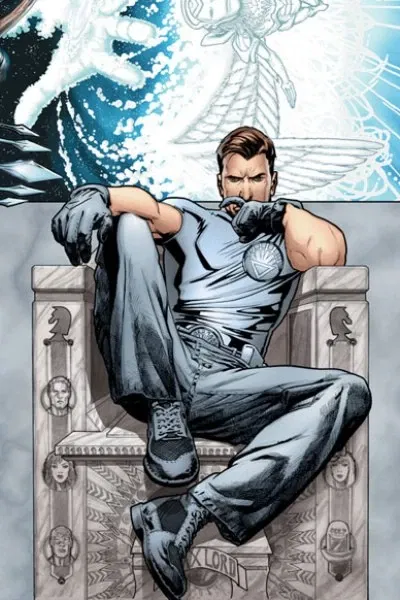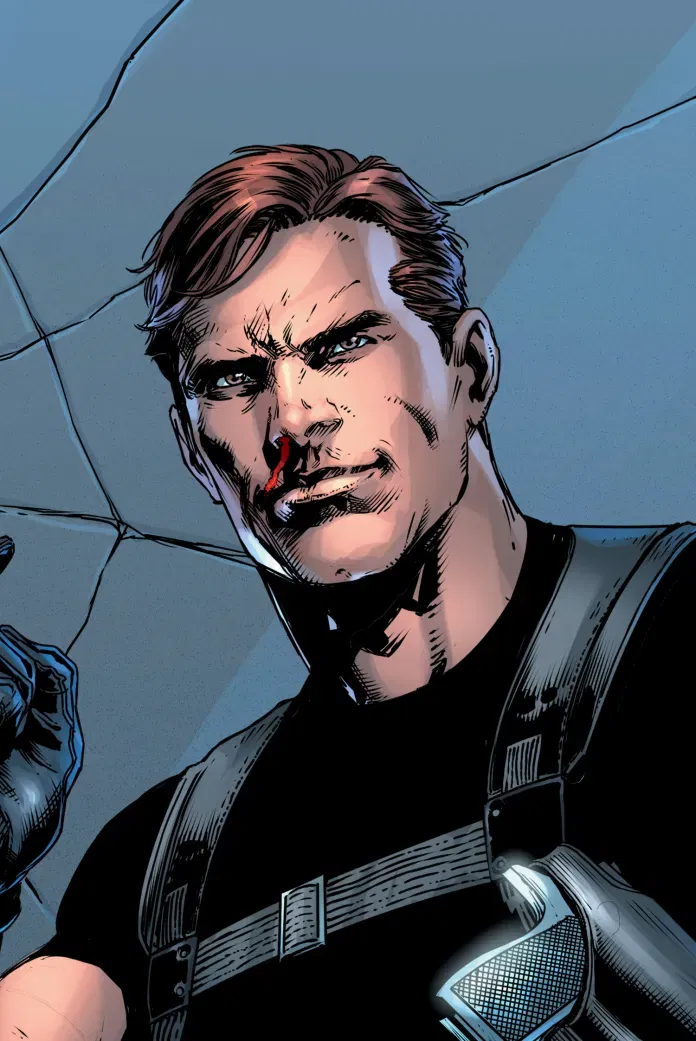| July 2047 | Edition nº106 |
Maxwell Lord x DC: The Rise of Control Incarnate
In a multiverse inhabited by aliens, gods, and timelines gone berserk, one of the most perilous threats to the existence of all these is a mortal man who believes that the only way forward is through control. Maxwell Lord isn't a monster from some alien world; he is somewhat scarier: a man with vision, a man with power, a man willing to manipulate the minds of the gods. As the DC Universe bends and splinters, Lord stands not to scatter nations before him physically but with belief—and the world may never be the same.

Who Is Maxwell Lord?
Maxwell Lord started as a charismatic billionaire financing Justice League International. But he was never just a finance wizard—he always thought several moves ahead. The awakening potential within him conferred psychic powers enabling him to influence thoughts and manipulate people without their conscious knowledge. Unlike standard mind control, his abilities operate with the utmost subtlety. The victims believe their actions are voluntary, making him nearly undetectable. But the undoing of Lord in the context of ringed villains lay in the fact that he does not destroy—he seeks order.He sees humanity as hopelessly flawed, irrational, and, at times, too chaotic to care for itself. His idea of solutions? Quiet domination achieved through persuasion and influence. He pictures himself in the role of a necessary evil, one whose strength allows him to take the difficult decisions that others cannot. When confronted by heroes like Blue Beetle or Wonder Woman, they are not just confronting a villain; they are confronting a worldview. Lord is not the death of freedom; he is the enabler for its extermination.
Mind Over Muscle: How Maxwell Lord's Powers Work
Maxwell Lord's psychic ability is not so much about overpowering minds; it is more about slipping in. He can suggest correlated actions, redirect choices, and nudge people into making decisions they feel were entirely of their own accord. Varying ranges and strengths may underlie the actual application, most dangerous applying this ability with his mental intellect, be it Batman realizing far too late that Lord gently nudged a key ally into an abandonment of a mission, or Superman's inner uncertainty stemming from an inability to trust his own mind.Throughout various continuities, Lord's powers have evolved: Historically, he has gone from short-range suggestion to large-scale mental manipulation. In some stories, he is depicted to suffer side effects from overusing his powers such as nosebleeds, numbness, and headaches. While in others, he uses them with unnerving ease. And sometimes, such subtlety makes him the most potent. Lord doesn’t weaken you; he weakens your will until you don’t even know it’s broken. In whole worlds full of display powers, he is good at being just the opposite: unnoticed. And that kind of invisibility is deadly.

Maxwell Lord in the DC Universe Today
The modern DC Universe is one messy multiverse, full of contorted timelines, existential threats, and gods drifting toward moral dilemmas. Enter Maxwell Lord, one man who feels it is his responsibility to grant clarity. He wouldn't build bombs; he'd build systems: networks of influence, political control, predictive algorithms, and psychological nudges. He would probably exercise the shadows in major tech corporations or intelligence agencies, gently shifting the course of humanity toward his vision of peace. Lord would view superpeople not as saviors, but as an unknown variable—in other words, a wildcard that's too dangerous to leave unattended.Perhaps he might quietly propagate initiatives to conduct surveillance on metas, reprogram wayward heroes, or realign Earth entities through mental manipulation. To Lord, Superman embodies all the chances for free agency: to be, if anything, and a ticking risk. Batman forsakes such restraint for possible control—while Lord spends his life cultivating, building, and growing compliance. In a world of extremes, cosmic gray is Maxwell's domain: somewhere between villain and savior. And that ever-elusive landscape lends him perfectly to the theme of the modern DC Universe.
The Justice League vs. Maxwell Lord
Lord doesn’t face qualified superpowers against the Justice League; he puts a threat against their unity. Why punch Superman when with a gentle nudge he can sow doubt in the mind of Lois Lane? Why outsmart Batman when all he needs to do is change one variable in the loyalty of one member of his Bat-Family? Lord’s agenda rarely centers on destruction; instead, it is always about disruption. He could craft an idea that would have Wonder Woman seen as the tyrant, Flash freaking out over his own memories, or supporting Green Lantern by eroding the willpower of his ring, for example. He unravels the seams and sits back to watch the League crumble under its weight.This battle is not a battle of fists; it is a battle of minds. Even the League’s greatest asset—its diversity—would soon be counted as a disadvantage whenever Maxwell was pulling his invisible strings just beneath the unknowing surface. When they finally get close enough to confront Lord, all they find is a very well-suited man armed with data, logic, and unnerving calmness. He does not desire the League's destruction; he prefers to prove its superfluity.

Maxwell Lord vs. the Villains of DC
Lord may hate the villains, but he knows them-and at times, he uses them. Characters like Lex Luthor or Vandal Savage may align initially with his goals, but, in the end, they are destined to clash on grounds of ideology. The Lord does not seek power for power's sake; he wants compliance. So, even villains can become either his unwitting pawns or his most ardent adversaries. Brainiac may appreciate Lord's efficiency but find him unpredictable. Amanda Waller may see him as competition.Lord might work behind the scenes to manipulate the Suicide Squad, causing them to unknowingly execute certain portions of his plan-all the while planting ideas in the minds of antiheroes like Black Adam or Red Hood to nudge their sense of justice. The result? A conflict where even the villains don't know they are participants in Lord's experiment. Unlike most masterminds, Lord doesn't believe in loyalty; he believes in utility. Once a person ceases to be of any use, he will wipe clean their very existence even before they realize it. Friends today. Drones tomorrow.
Why Maxwell Lord Should Be in DC's Future
Maxwell Lord is more than a villain-he is a commentary. In an age characterized by surveillance, social manipulation, and algorithmic control, Lord represents our greatest fear: the loss of autonomy under the guise of protection. The relevance of his character cannot be overstated. As DC seeks to create new forms of storytelling-from multiverses to Elseworlds and digital futures-Maxwell Lord would be the perfect antagonist to test the soul of heroism. One imagines a fresh crossover event-"Lordworld Protocol"-where Lord attempts to launch a peace initiative that rewires the thoughts of Earth's whole population.The heroes will have to decide: save the world or let it be free? The conflict morphs into a moral one, rather than a physical one. He could ask Lanterns to define will, challenge Martian Manhunter to ponder telepathic ethics, or force Raven to consider consent in spiritual matters. Maxwell Lord does not just pose a threat to cities-he poses a threat to ideas. And in doing this, he revitalizes old characters and puts familiar powers in a position of vulnerability. In the future of DC, he is not optional-he is essential.
How much do you know about Maxwell Lord? What is your opinion about him? Share with us in the comments to earn a Limited Edition Comic Book Pack for your collection!